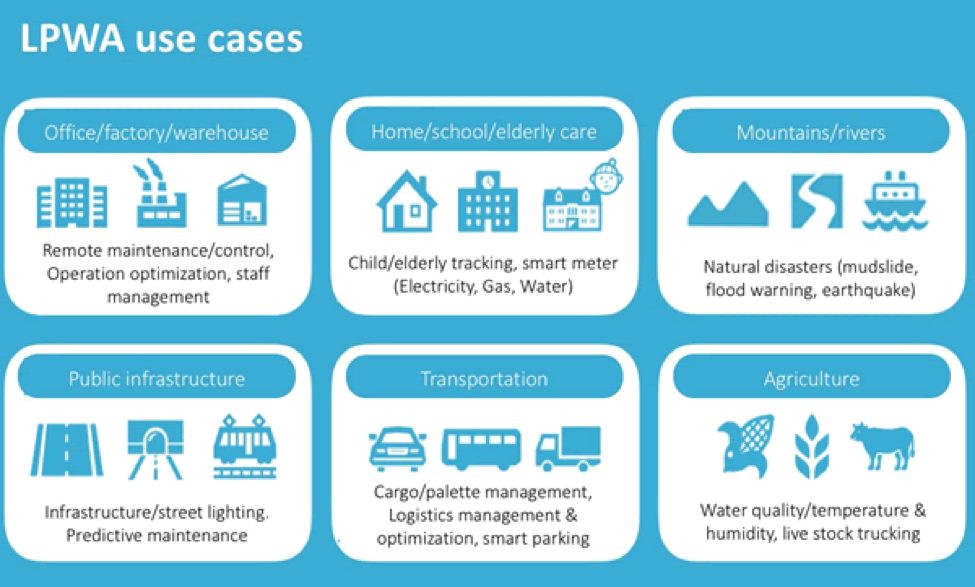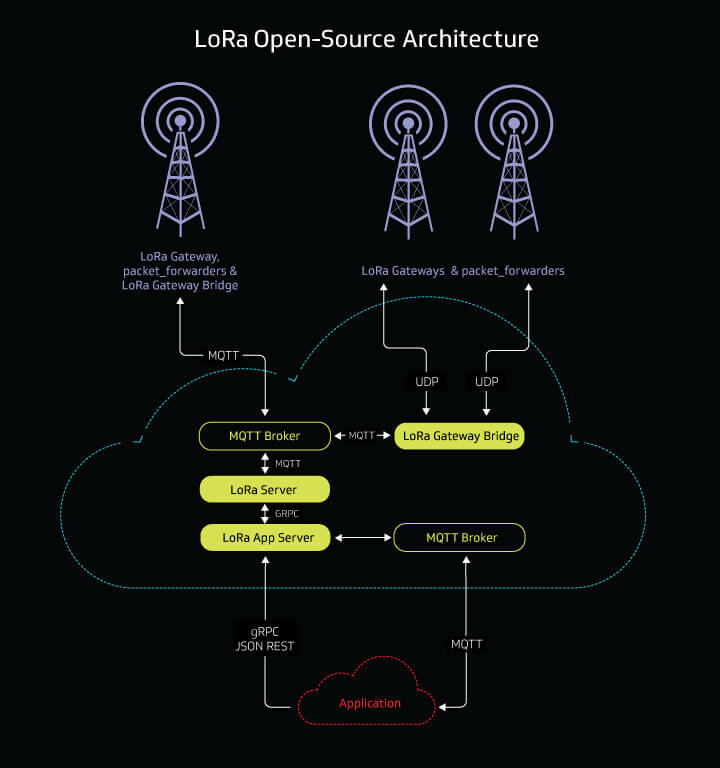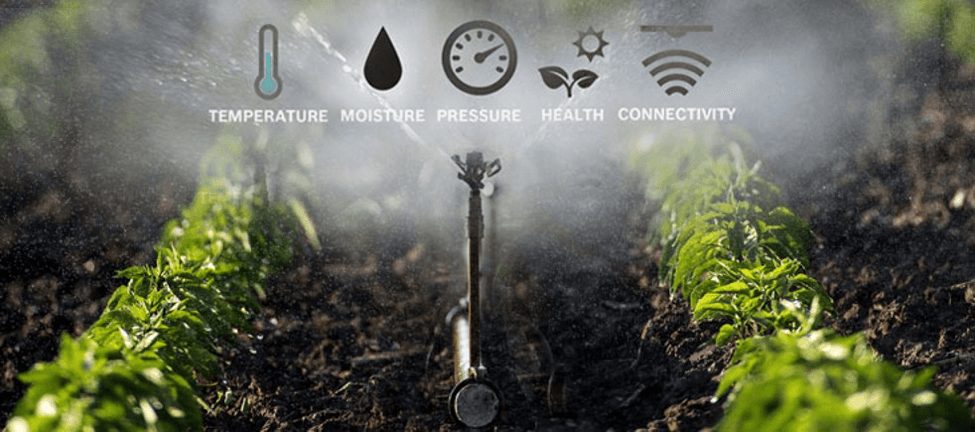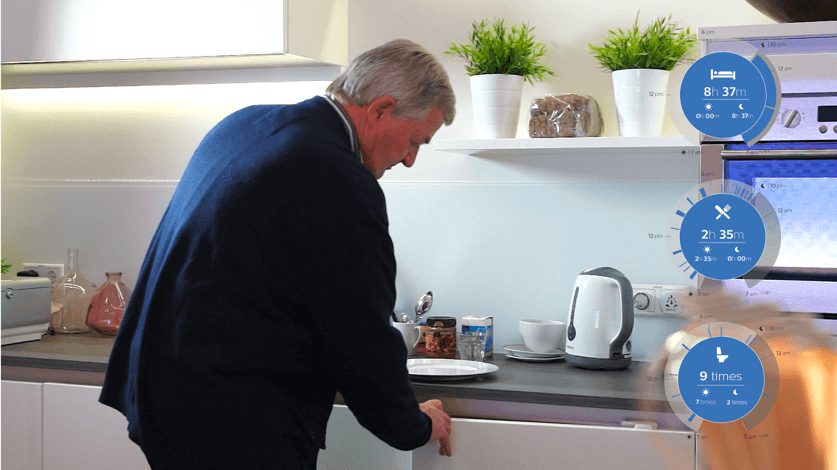Innovation
CableLabs Announces an Open Source LoRaWAN Network Solution

The Internet of Things (IoT) is a growing industry comprised of a massive number of devices that connect to each other to benefit our lives. Examples of these include the Nest thermostat, security cameras, Amazon’s Alexa, and Apple Watch. Refrigerators can talk with the internet to order milk and Fitbits tell you when to step more to meet your daily exercise goals.
A new area of IoT involves the use of sensors designed to last for years on a single battery transmitting information periodically over long distances. The infrastructure to support all of these connected devices is commonly referred to as a Low Power Wide Area Network (LP-WAN).
 Figure 1 - LPWA use cases graphic by LoRa Alliance member Actility at the occasion of its collaboration with Softbank in Japan
Figure 1 - LPWA use cases graphic by LoRa Alliance member Actility at the occasion of its collaboration with Softbank in Japan
LP-WAN networks are designed to cover large geographical areas and minimize the amount of power required for sensors to interact with the network. There are many solutions available to enable this network, including Ingenu, Sigfox, LoRaWAN, 3GPP and Weightless.
CableLabs is pleased to announce an open-source LoRaWAN solution. LoRa is a semi-proprietary solution as it is owned and licensed by Semtech, and a closed consortium (i.e. LoRa Alliance) develops the LoRaWAN specification around the Semtech solution architecture.
Once the consortium concludes a revision of this effort, they make it publicly available. Ingenu and Sigfox are examples of fully proprietary solutions with closed development and ecosystems. In an effort to be more open, they have software development kits available for sensor manufacturers to create sensors for their networks. Of course, these are merely examples of many more solutions emerging in this space. All of them are attempting to create their own advantage and benefits for network providers and consumers. We attempted to highlight some of the more commonly known solutions available, but these are not meant to be preferential or endorsed by CableLabs and are not an exhaustive listing.
LoRaWAN is a long range, low power wireless protocol that is intended for use in building IoT LP-WAN networks. IoT devices send small data packets to any number of “gateways” that may be in the several-kilometer range of a sensor via the LoRaWAN wireless protocol. The gateways then use more traditional communications such as wired Internet connections to forward the messages to a network-server which validates the packets and forwards the application payload to an application-server.
CableLabs chose to develop a LoRaWAN open-source solution because we believe it is a good compromise between proprietary and open solutions, and it provides many of our members an opportunity to compete in the low power wide area (LPWA) space.
 Figure 2 - LoRaWAN Example Network Architecture
Figure 2 - LoRaWAN Example Network Architecture
In the past, CableLabs has often developed solutions specific to the cable industry, but we believe open-source provides consumers a great benefit as it will spur growth in an industry intended to enrich our lives. This enrichment comes through devices intended to inform us of many things. For example, many of us have driven by a city park during a rain storm and noticed the sprinkler system running. This is a waste of water and further impacts our climate. What if we had soil moisture sensors that could communicate with a sprinkler controller to inform it when it requires water? This could save countless gallons of water, which is extremely valuable, especially in drought-stricken regions.
 Figure 1 - LPWA use cases graphic by LoRa Alliance member Actility at the occasion of its collaboration with Softbank in Japan
Figure 1 - LPWA use cases graphic by LoRa Alliance member Actility at the occasion of its collaboration with Softbank in Japan
Another example could be to inform a loved one when an aging relative has taken their pills for the day, gets out of bed or sits in a chair too long. All of these are examples of the benefits of sensors enabled by LP-WANs.
 Figure 4 - Philips CareSensus Solutions
Figure 4 - Philips CareSensus Solutions
In order for us to realize these benefits, LP-WANs need to be deployed broadly across national and international regions. This will enable the use of many sensors across these same regions. As we make use of the sensor data, it will enrich our lives with information to make better choices, ensure higher quality results and guide us towards a better future. By making a portion of this network available for open-source, our goal is to lower the barrier for the cable industry and other industry participants to enable these solutions for consumers and governments. Together we can truly change the world, and it should not be limited by costly barriers.
-
More information on the CableLabs LoRa server, including documentation and code repository, can be found here.
With a strong focus on innovation, CableLabs develops technologies and specifications for the secure delivery of high-speed data, video, voice and next generation services. Don't forget to subscribe to our blog to read more about our innovative technologies in the future.



